Menu
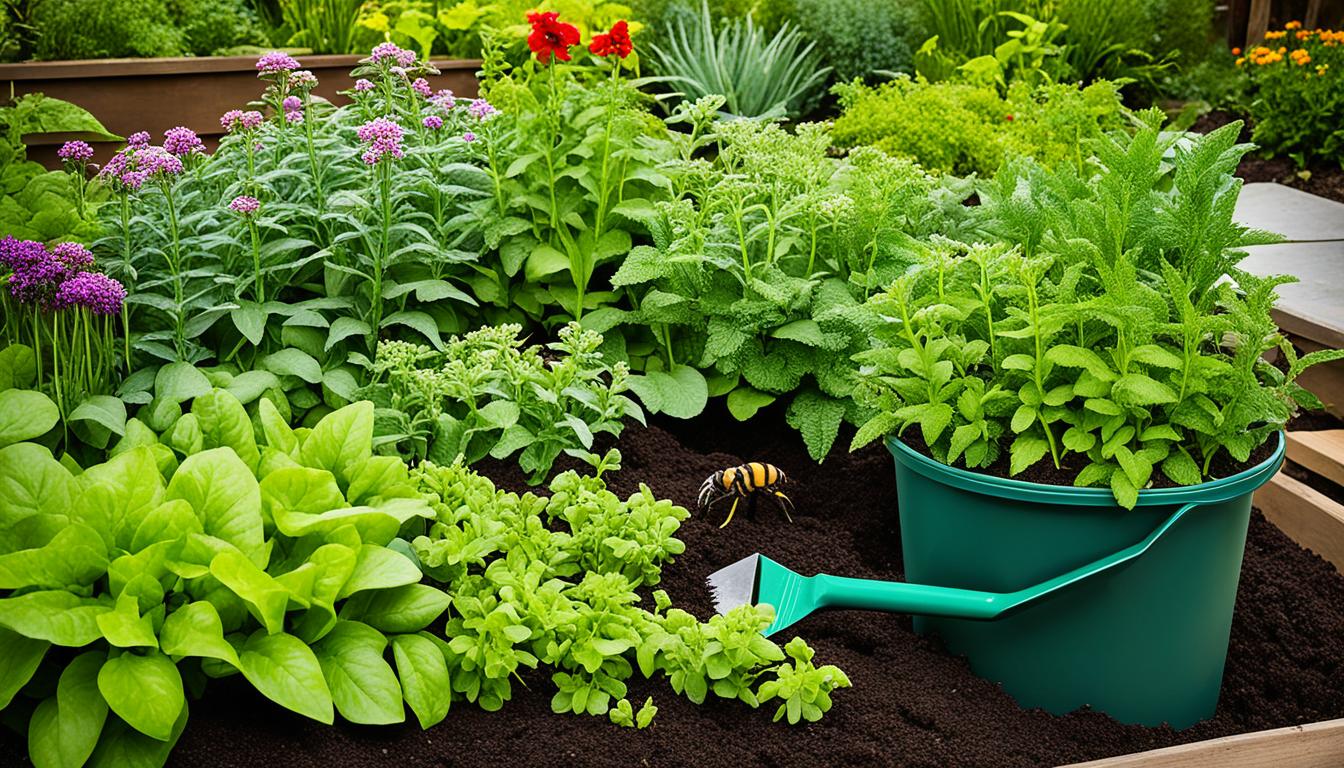
Organic matter, like compost, boosts the soil’s living organisms. It can also help the soil hold 30% more water. These are just some of the perks of making your soil more fertile. Good soil is the foundation for plants to grow well and produce a lot.
This article will explain why soil fertility matters. It will also share ways to enrich your garden soil naturally. By using organic gardening methods, you can make your plants healthier and increase your harvest. Knowing about soil fertility is key to taking good care of your garden.
Soil fertility means the soil is rich in nutrients and creates good conditions for plants to grow and produce well. Gardening successfully depends on managing nutrients effectively and making the soil better.
Soil fertility is how well the soil can give plants the key nutrients they need. It’s like setting up a buffet full of nutrients for plants to thrive on. Managing soil nutrients properly keeps the soil fertile.
The main nutrients for fertile soil are nitrogen, phosphorus, potassium, magnesium, and calcium. These nutrients help plants grow, from making leaves to strengthening roots. Elements like iron and zinc are also crucial but must be in careful amounts to avoid harm.
A well-balanced soil system makes sure plants get the nutrients they need without problems. It prevents both too much or too little of these nutrients.
Having too much of a nutrient can affect plant growth negatively and harm water. That’s why regular soil tests are vital to adjust lime and fertilizers correctly. Keeping the soil balanced is crucial in managing its nutrients well. For example, too much nitrogen can stop plants from growing well.
Also, the pH of the soil is crucial because it affects how plants can use nutrients. A balanced soil system ensures these nutrients are available for plant use.
“High yields can be achieved from poor fields with proper soil fertility management practices.”
In essence, sustaining soil fertility is about maintaining a healthy mix of nutrients, organic matter, and the right pH. This method creates a nutrient-rich environment that boosts soil quality and helps plants grow strongly.
Fertile soil is vital for a healthy garden. It helps plants grow well and supports a diverse ecosystem in the garden. This is due to its rich organic matter and the variety of life found in good soil.
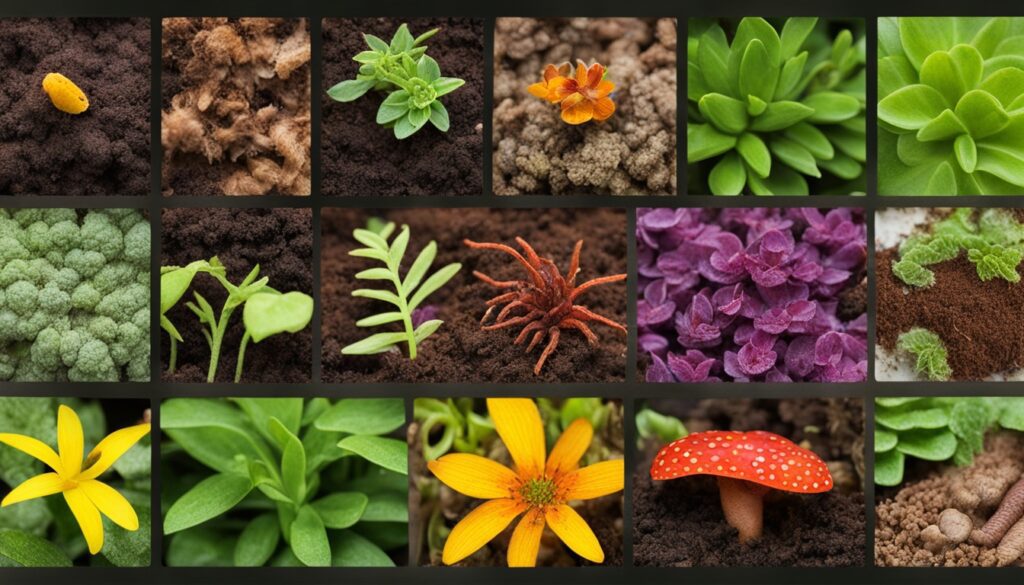
Fertile soil boosts plants by giving them rich nutrients. It helps roots grow deep, leaves stay healthy, and brings a good harvest. The cation exchange capacity (C.E.C.) is important. It shows how well soil can keep and give out nutrients to plants.
Healthy soil also makes plants strong against diseases and pests. It is full of organic matter, which gives plants vitamins and minerals. These nutrients, like nitrogen, phosphorus, and potassium, help plants fight off problems.
Fertile soil holds water well, which is great for plants. Even when it’s dry, the soil keeps plants watered. This is possible because of its loose texture and added compost, which keep a good space for roots and water.
Rich soil is full of life like helpful bacteria and earthworms. They break up old plant parts and provide food for plants. A mix of these microorganisms helps keep the soil healthy for plants to thrive.
Fertile soil has the right mix of sand, silt, clay, and organic matter. This mix helps air and water move freely, perfect for roots. It’s also great for plant nutrition and growth. It usually has a pH level that’s just right for most plants.
Using organic fertilisers and compost is a good way to make soil healthier. It promotes a great environment for plants to grow strong. Gardeners who care for their soil have better gardens. They get more produce and enjoy their plants even more.
Finding out if the soil is fertile is key for great plant growth. There are many ways to check the health of your garden’s soil. You can use soil test kits or look at how well your plants are growing.
DIY soil test kits are a top way to check your soil. They help you measure the nutrients and pH balance right in your garden. These kits give fast, trustworthy results, which can guide you in boosting soil health.
Well-growing, vibrant plants show that the soil is rich in nutrients. Weak or off-coloured plants might need more checking. It could mean the soil lacks something important for plant growth.
Earthworms tell a lot about the soil. If you see many earthworms, it’s a sign the soil is full of good stuff for plants. They help keep the soil loose and improve its nutrients for plants.
Finding out how much organic matter is in your soil is very important. Soil full of organic matter holds water better and gives plants key nutrients like nitrogen and phosphorus. Adding compost or manure boosts this content.
The texture of the soil is crucial for its fertility. It’s about the sizes and the mix of soil particles. The right texture helps with holding nutrients, supporting good bacteria, and lets roots grow well, helping plants stay healthy.
The pH level of the soil affects how well plants can use nutrients. The best pH levels for most plants are between 6.5 to 7.5. If it’s too high or low, plants might not get the nutrients they need. Regular checks can help you keep the pH right.
Improving soil fertility is key for a successful garden. Using the right soil nutrient management helps soil become healthier and more productive. Composting is very effective. Good compost has a carbon to nitrogen ratio between 25:1 and 40:1. It also needs to stay hot, between 131°F and 170°F, for at least 15 days.
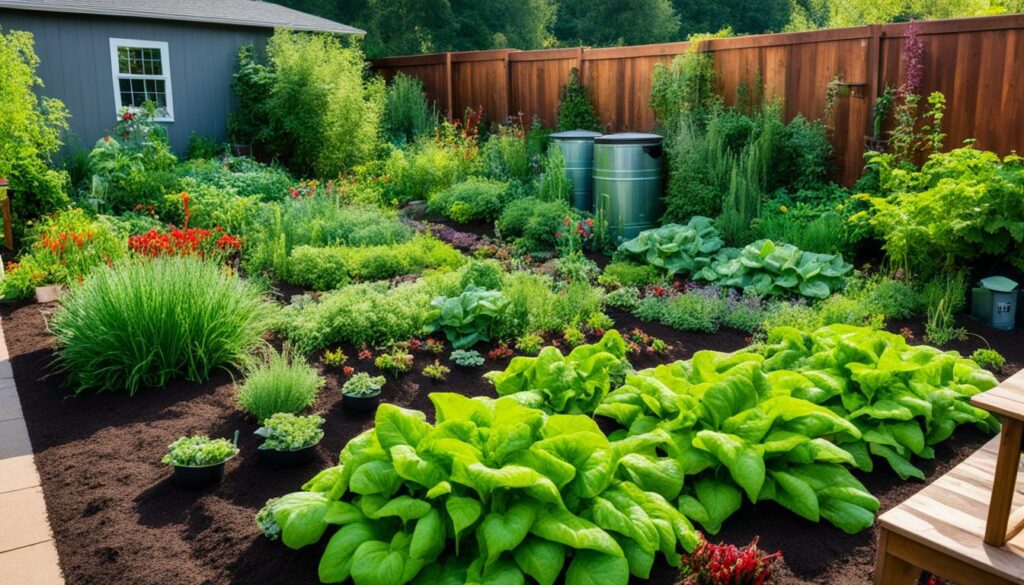
Adding manure is important too. Cow manure boosts soil with 10 to 15 pounds of nitrogen, 5 to 10 pounds of phosphorous, and 10 to 12 pounds of potassium in each ton. Poultry manure is even richer in these nutrients.
Using cover crops is another top method. They help stop erosion, nutrient loss, and improve water control and diversity. Planting them when fields are not being used can boost soil fertility a lot.
Organic mulch keeps soil moist and stops weeds. It helps keep the ground full of water and looking good by using natural materials.
Try adding biochar to the soil. It keeps nutrients and water better, making a good home for tiny soil bugs.
Vermicomposting is great for kitchen and garden scraps. Worm castings are super for the soil as they are full of good stuff for plants. Also, alfalfa, soybean, blood, feather, and fishmeal boost nitrogen and make the soil healthier.
| Organic Amendment | Nitrogen Content | Phosphorus Content | Potassium Content |
|---|---|---|---|
| Cow Manure | 10-15 lbs/ton | 5-10 lbs/ton | 10-12 lbs/ton |
| Poultry Manure | Higher than cow manure | Higher than cow manure | Higher than cow manure |
| Alfalfa Meal | 3% | Low | Low |
| Soybean Meal | 6% | 1.4% | 4% |
| Blood Meal | 12-13% | Low | Low |
| Feather Meal | 7-10% | Low | Low |
| Fishmeal | 10% | 6% | Low |
“Tailoring garden practices to the specific needs of the soil is essential for boosting fertility. Sustainable and organic methods are at the heart of increasing soil productivity.” – Expert Gardener
These methods will make your garden’s soil better and keep it that way. By focusing on sustainable soil management, you’ll grow a garden that’s full of life and big harvests.
Starting a compost habit is great for enriching soil. It’s a green way to re-use kitchen scraps and deal with yard waste. Compost boosts your soil’s nutrients and keeps it healthy.
Getting into composting is easy and very helpful. Put a compost bin in a good spot in your garden. You need the right mix of green and brown materials. This keeps your compost pile healthy. Regular turning and the correct amount of water help it decompose well.
Making your own compost is a top way to improve your soil. It acts like a natural fertiliser, giving plants important nutrients. Compost also makes soil better at holding water, and it helps good bacteria thrive. This all makes your garden stronger and more productive.
Kitchen scraps like fruit peels and coffee grounds are perfect for compost. For yard waste, use things like grass clippings and leaves. But, don’t put meat, dairy, or greasy foods in your compost. This keeps away bad smells and pests. Knowing what to add lets you make great compost for your soil.
Learn about different soil types and how compost can help improve them:
| Soil Type | Characteristics | Challenges | Benefits of Compost |
|---|---|---|---|
| Sandy Soil | Fast drainage, low nutrients, lots of air | Not many nutrients, can’t hold water well | Boosts nutrients, helps hold water |
| Clay Soil | Keeps a lot of water, drains slowly, very dense | Gets waterlogged, soil gets hard | Makes air flow better, prevents hardness, helps bacteria |
| Silty Soil | Heavy but not dense, some nutrients, not great at draining | Drains poorly, prone to erosion | Makes soil’s structure better, drains more, keeps soil alive |
Using cover crops is a smart move for farmers. It boosts farm output and helps the environment. By planting cover crops, farmers tackle soil erosion, up soil quality, and keep nutrients in the soil.
These practices are especially useful when fields are not being used. They help keep the soil healthy. This is good for farming and the planet.
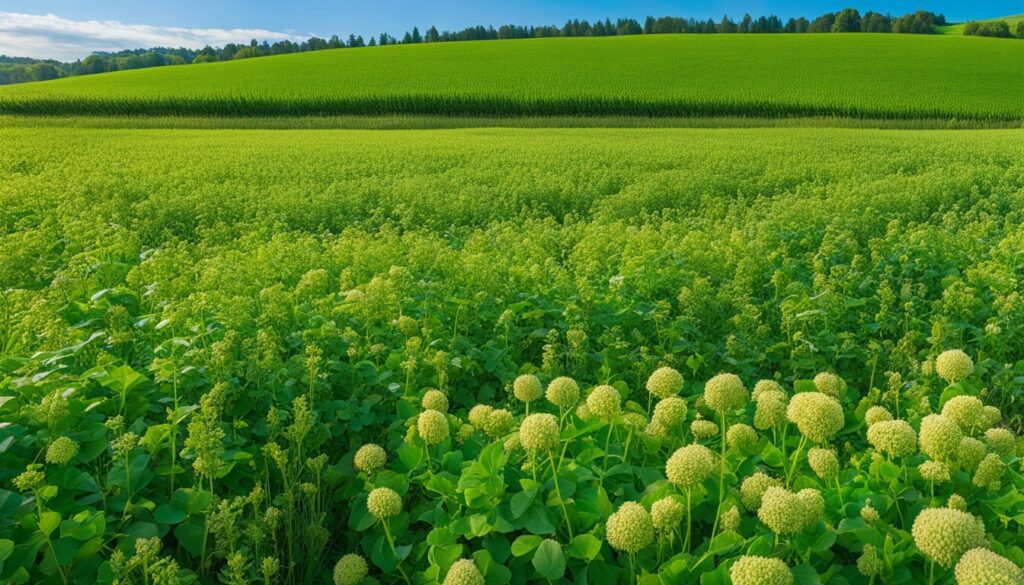
Cover crops also keep soil covered, stopping it from washing away. This is a big deal. It cuts down losses from soil erosion by a lot. For example, in the U.S., it reduces tons of sediment washing away each year.
By making soil richer and cutting nitrogen loss, they help crops grow better. They keep essential nutrients in the soil. Some studies even show they can cut nitrogen loss by nearly half.
When it comes to reducing phosphorus in water, cover crops do a great job too. They can cut it by anywhere from 15% to 92%. Certain kinds, like legumes, boost the health of the soil a lot.
But cover crops don’t just help soil; they help keep it for the long-run too. They reduce soil loss by a lot compared to old ways of farming. This is key for a sustainable future in farming.
The Midwest Cover Crop Council helps pick the right cover crops and times to plant. Farmers should choose different cover crops based on the season. They must plant them correctly to get the best results.
Adding cover crops to practices like no-till farming helps soil even more. It makes fields better for planting and increases crop yield. Even though many farmers are using cover crops, more should join in. It’s good for the land and our water.
| Field Type | Sediment Loss Reduction (tons/acre) |
|---|---|
| Conventional-Till | 20.8 |
| Reduced-Till | 6.5 |
| No-Till | 1.2 |
Cover crops help soil, and they’re also great for nature. They give bees and other pollinators a home. Plus, they help soil fix nitrogen naturally. So, using cover crops wisely is key to better farming and a healthier world.
Organic mulching helps keep soil healthy and supports sustainable gardening. Gardeners use it to improve the soil’s ability to hold moisture, stop weeds, and control temperature.
Many materials can be used for organic mulch in gardens. Some top choices are:
Each kind of organic mulch provides different benefits. Grass clippings break down fast, adding nutrients and making soil better. But straw and seedless hay should be used thickly to stay in place.
Mulching organically brings many good things to a garden:
It’s important to put mulch down the right way for it to work well. Here are some tips:
Using organic mulch is great for saving water and keeping weeds away. Picking the right materials and applying them the right way makes your garden much healthier.
Adding well-rotted manure to your garden helps the soil stay healthy and feeds your plants. It includes important nutrients and makes soil better. This is great news for anyone who likes to keep their garden chemical-free by using natural materials.
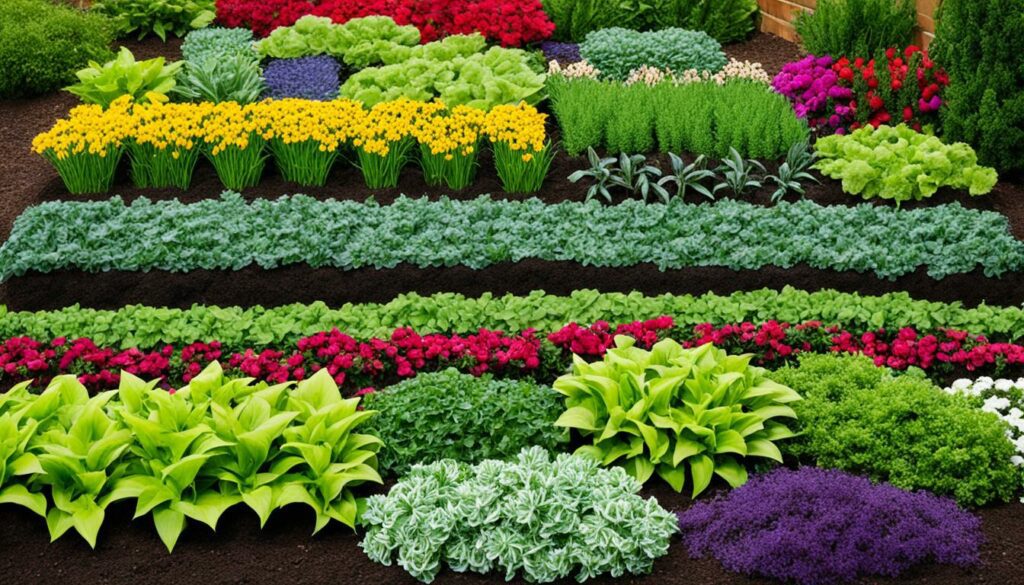
Different manures offer various benefits for the soil. Fresh poultry manure is very strong because of its high ammonia and nitrogen. It quickly improves the richness of the soil. But, fresh horse manure might have weed seeds and be too salty. It’s wise to be careful when using it. Remember, not all animal manure is the same. In the first year, most manure gives up 70% to 80% phosphorus and 80% to 90% potassium.
Using manure right is key for it to work well. It’s best to add it to the soil in spring or autumn. Aim for 5kg of manure for each square meter. If you spread a 10cm layer on top like mulch, it also helps the soil.
But, don’t use fresh manure on veggies, especially roots, to avoid getting sick. Mixing manure into the soil stops problems like too much nitrate or nutrients washing away. This keeps your garden healthy and in balance.
| Manure Type | Key Attributes |
|---|---|
| Poultry Manure | High in ammonia and soluble nitrogen |
| Horse Manure | Contains weed seeds and high salt content |
Vermicomposting is an eco-friendly way to recycle organic waste. It boosts soil fertility using earthworms. These worms turn organic waste into nutrient-rich compost, or worm castings. This not only breaks down waste but also makes the soil better. It’s great for people who want to garden in a sustainable way.
Starting a vermicompost bin is easy. You need a good bin, some bedding, and composting worms. Make sure the bin has air holes and good drainage. This keeps the worms happy. They eat things like fruit scraps and coffee grounds. Keep an eye on the waste to see the composting progress.
Pick a good spot for your vermicompost bin. It should be shady and easy to get to. The right temperature, between 55-77°F (13-25°C), and moisture help the worms work well. After a while, about 45 to 60 days, you’ll have your first batch of rich worm compost.
Worm castings are a superfood for the soil. They’re packed with bacteria, organic stuff, and key plant nutrients. Plants can use these nutrients easily. This leads to stronger plant growth and better harvests.
Worm castings also make the soil team with beneficial microbes. It can be 20 times more than ordinary soil. This helps soil in many ways, like holding water better. Plants then grow healthier because the soil is in good condition. They also take in more nutrients.
A vermicompost bin in your garden is a win-win. It turns trash into treasure and cuts down on chemical use. This makes your gardening efforts better for nature.
Green manure is vital for earth-friendly gardening. It helps keep the soil full of nutrients and stops it from washing away. This method has been used for centuries in places such as Ancient Greece and the Roman Empire. Today, it’s more important than ever due to climate change and soil problems.
Picking the right green manure depends on what your soil needs. Leguminous plants like clover and vetch are great because they add nitrogen to the soil. This helps crops grow better later. Plants like lupin are also good because they can grab phosphorus from the soil, which is vital for plants.
It’s critical to choose the best green manure for your soil’s health. Making the right choice boosts how well your soil helps plants grow.
Green manure crops provide many benefits. For one, they help make nitrogen available for future plants. They also add to the soil’s structure, making it more fertile and live. This lessens soil erosion too and helps keep water in the ground.
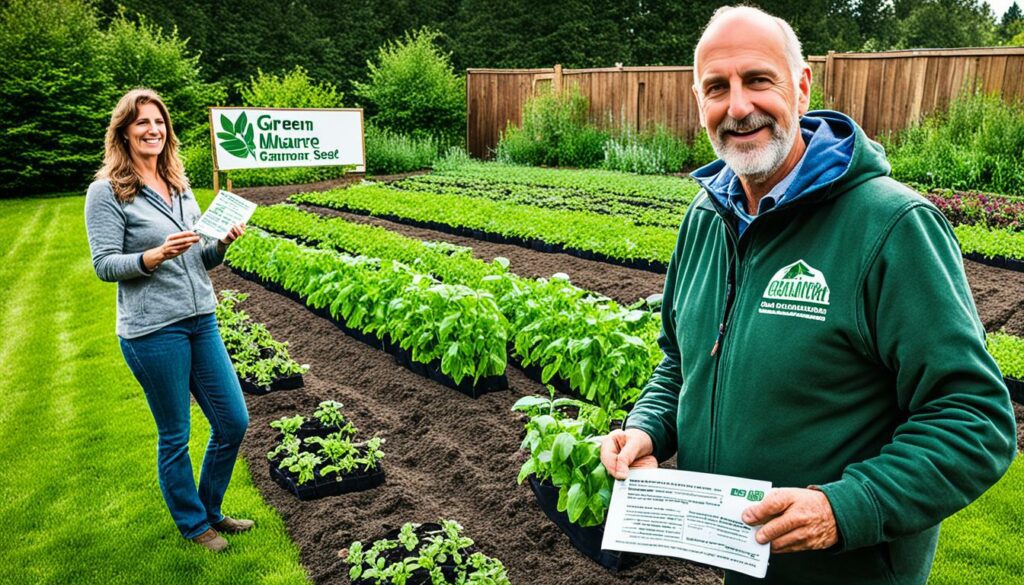
By planting green manures, you also fight weeds. They don’t like the changing ground conditions and the chemicals some green plants release. This helps keep bugs and diseases at bay. It even encourages good bugs and pollinators to live there.
In the end, using green manure makes your soil strong. It’s a great way to keep your garden producing well over the years. Plus, it’s kind to the planet. Everyone wins!
Using biochar can really boost the quality and sustainability of your soil. It’s great for keeping nutrients in the soil and helping it hold onto water. I’ll explain what biochar is and how you can use it to improve your soil.
Biochar is made from burning organic materials without oxygen. These can include things like grass, wood chips, and animal waste. This process turns them into a kind of charcoal that’s great for the soil. It improves the soil’s structure and helps it hold onto more nutrients.
Biochar has many advantages. It keeps nutrients in the soil longer, which is great for plant growth. This is very important in areas like India, where nutrients can easily wash away.
It also makes the soil hold water better and improves its quality in various ways. This means healthier plants and less need for water. Biochar even helps with compacted soil by making it smoother for plant roots.
Biochar works well with other natural fertilisers, too. This can lead to even stronger plants and bigger yields. It’s a win-win for your garden.
When using biochar, pick the right type and think about how to apply it. You can make biochar at home or find it ready to use. Mixing it well into the soil is the key. You can do this when you’re preparing your soil or layer it on top.
Start with a small amount and see how your plants react. They might need more or less, so keep an eye on them. Using biochar this way can turn your garden into a stronger, more productive space.
Organic soil conditioners are key to keeping soil fertile. They give important nutrients and make the soil better. Healthy soil can keep and share nutrients for plants. It’s vital to pick the right ones for your garden’s needs.
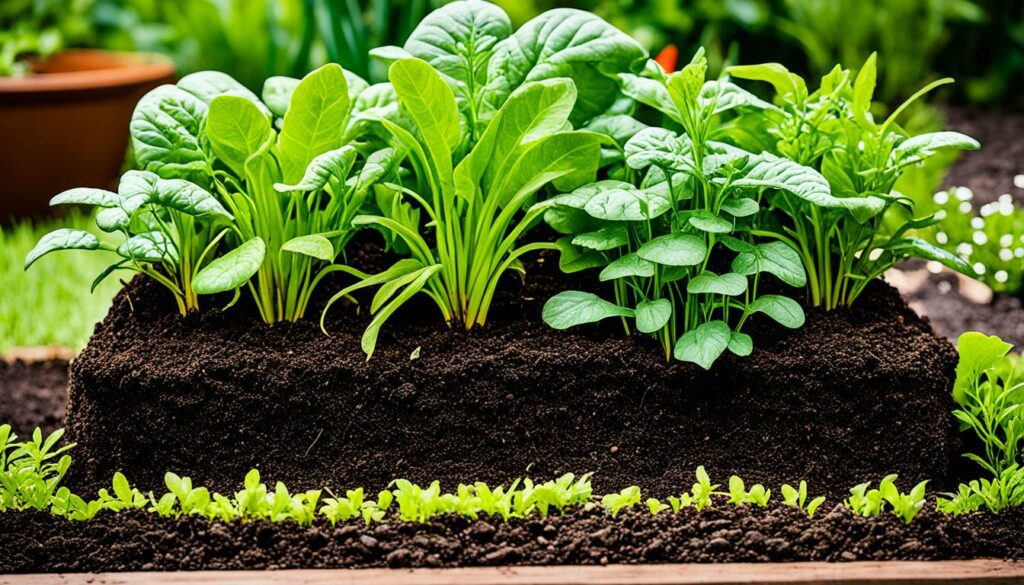
There are many kinds of organic soil conditioners. They all help with soil health in different ways. You can find:
Various soil conditioners offer unique benefits. They keep the environment healthy. Let’s take a close look:
| Soil Conditioner | Nutrient Content | Benefits |
|---|---|---|
| Animal Manure | High in nitrogen, phosphorus, potassium | It helps plants grow fast and makes the soil better |
| Compost | Varies widely, usually high in organic matter | It improves the soil’s makeup and ability to keep nutrients |
| Green Manure | Made of plants, mainly gives nitrogen | Increases nitrogen in the soil and stops weeds |
| Biochar | Changes by type but has lots of carbon | Makes the soil hold water better and gives more nutrients |
| Slow-release fertilisers | Gives nutrients slowly over time | It makes plant roots stronger and helps them grow well for a long time |
Getting the timing and method right is important when using these conditioners. For example, use manure in the soil 120 days before you plan to harvest. This keeps your veggies safe to eat. Also, compost from a trusted source can be used all season long. It bumps up the soil’s fertility when needed. This careful choice of natural conditioners can help your plants grow strong and healthy.
Compost tea is a strong liquid fertiliser from natural sources. It boosts soil health and plant strength. Made from nutrient-rich compost, it helps plants grow better and keeps the soil healthy.
To make compost tea, soak compost in water. This makes a powerful plant food. Put mature compost in a bag, then in a water container. Let it sit there for a few days. Make sure the water gets enough air. This method, whether with or without air, is good for making tea, according to Mohd Din et al..
Using compost tea can make your garden better. You can spray it on leaves or pour it into the soil. Both ways feed your plants. They get the food they need and good microbes, making them grow strong.
Studies show compost tea helps a lot. Taha et al. found it helps more soil creatures grow. These creatures help plants take in food better. Compost tea also boosts crop harvests and quality. It’s a key thing for green gardening.
| Study | Findings |
|---|---|
| Doan et al. | Vermicompost and biochar improved corn yield and water availability |
| Goswami et al. | Enhanced soil health, nutrient availability, and microbial diversity |
| Taha et al. | Increased soil bacteria and fungi, improved nutrient uptake in radish leaves |
| Mohd Din et al. | Both aerated and non-aerated extraction effective for pak choi |
| Remedios Morales-Corts et al. | Lower potential phytotoxicity in vermicompost tea compared to thermophilic compost tea |
Compost tea is great for green gardens. It’s a top choice for plant care.
It is important to use the right strategies to make soil fertile. One great way is crop rotation. This method keeps soil nutrients balanced and lowers the number of pests and weeds. Farmers change the types of crops they plant in the same place. This stops the soil from losing too much of one kind of nutrient and becoming tired.
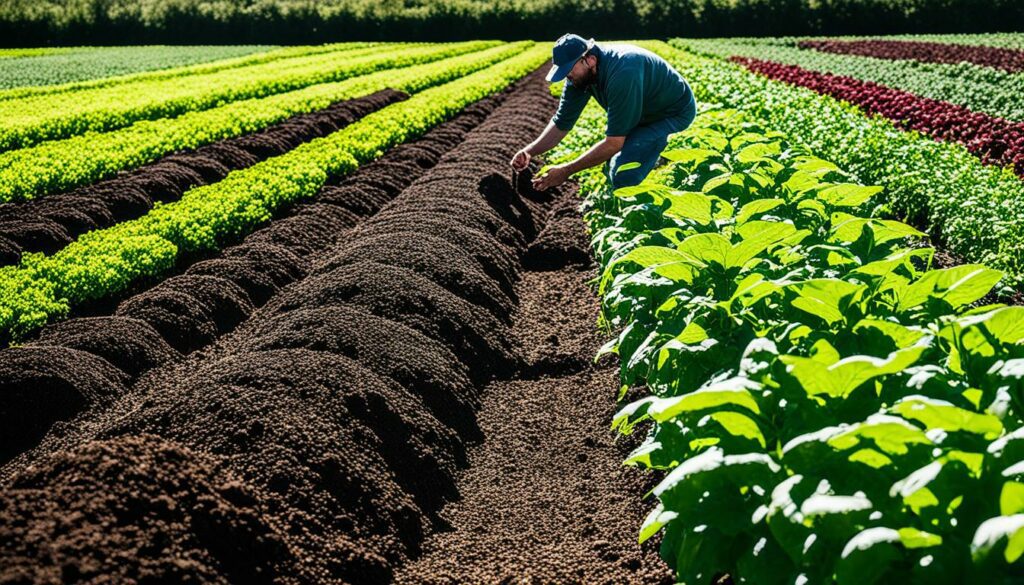
The no-till gardening methods are also key. They don’t disturb the soil much, which keeps its natural shape and life. This helps the soil hold on to organic material. It makes sure that tiny life forms in the soil can do their job better, which is moving nutrients around. This makes sure the plants have what they need to grow well.
It’s really important to keep checking the soil’s health. This way, farmers can see if the soil needs more of certain nutrients or adjustments. Adding things like compost and making sure the soil’s acidity is right are crucial steps.
So, combining crop rotation and no-till gardening, with regular soil checks, is a winning formula. It boosts how well a garden grows and lasts over time. This means your garden does well now and sets it up for success in the future too.
As we end this detailed guide on making soil better, it’s clear that using the right methods is key to a successful garden. Good soil health is vital for plants to grow well and produce a lot. Even poor fields can become very productive with the right care.
Humus, filled with nutrients, creates a perfect place for crops to grow. Elements like soil type, minerals, and water content are crucial for soil health. We must always test the soil to check its condition and see if it lacks any nutrients. This helps us know how to make the soil better.
Bad soil health is usually because of wrong fertiliser use and other harmful farming practices. Such problems hurt plants and the environment. But, by using smart methods like changing crops each season and avoiding digging, we can make things better. These methods help improve the soil and protect the environment at the same time.
Fertilisers are also important to make up for any nutrients the soil lacks. We need elements like nitrogen, potassium, and others for plants to grow. Planting certain crops can also help the soil become richer. They do this by adding nitrogen back into the soil naturally.
Using methods like these regularly will lead to a successful, sustainable garden. It will also mean you get more produce that is healthy and good for the environment.
Soil fertility means the soil can provide all the key nutrients that plants need. It helps plants grow strong and produce plenty of fruit or flowers. This includes nutrients like nitrogen, phosphorus, and potassium.
Good soil fertility is essential for healthy plants. It makes plants better at fighting off diseases. It also helps keep the soil moist during dry periods. This makes plants more likely to thrive.
You can check your soil’s fertility in a few ways. You could use a home soil test kit or just watch how well your plants are doing. Seeing a lot of earthworms in your soil is a good sign, too. Examining the soil for organic matter and its texture and pH levels will also give you clues.
Adding compost and mulch is a great start to make your soil more fertile. Growing cover crops and using manure also help a lot. There’s also a special type of composting called vermicomposting. This involves using worms to create nutrient-rich soil.Using biochar is another method to improve soil quality.
Composting adds nutrients that plants need to the soil. It makes the soil easier for roots to grow through by improving its texture. Compost also helps the soil hold onto water. This is good for the environment because it reuses waste from the garden and kitchen.
Cover crops, like green manure, benefit the soil in many ways. They add nutrients to keep the soil healthy. They also stop weeds from growing and make the soil texture better. This helps the soil and the plants in between your main plantings.
Mulch made of straw, wood chips, leaves, and grass clippings is good for the soil. It keeps the soil moist and stops weeds. It also stops the soil from getting too hot or too cold. As this mulch breaks down, it adds more nutrients to the soil.
Manure, when it’s well-rotted, is a gentle and natural way to make soil better. It gives the soil many nutrients plants need to grow. Manure also makes the soil better for helpful soil organisms. This leads to healthier plants.
Vermicomposting is making compost with the help of worms. The compost the worms make is full of nutrients. Putting this in the soil helps plants grow well. It also makes the soil a great place for helpful microbes.
Biochar is a special soil additive that makes the soil better at keeping nutrients. It also helps the soil keep water for the plants. Using biochar makes the soil richer and more alive. This is good for the soil’s long-term health.
Organic soil conditioners are better for the environment than chemical fertilisers. They give the soil just the nutrients it needs. This keeps the soil healthy. Healthy soil grows strong plants that give good harvests.
Compost tea is a liquid that’s very good for plants. It’s full of nutrients and things that help plants grow. Using compost tea on your plants makes the soil and the plants healthier. You can put it on the leaves or in the soil around the plants.